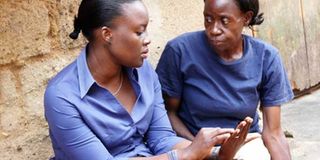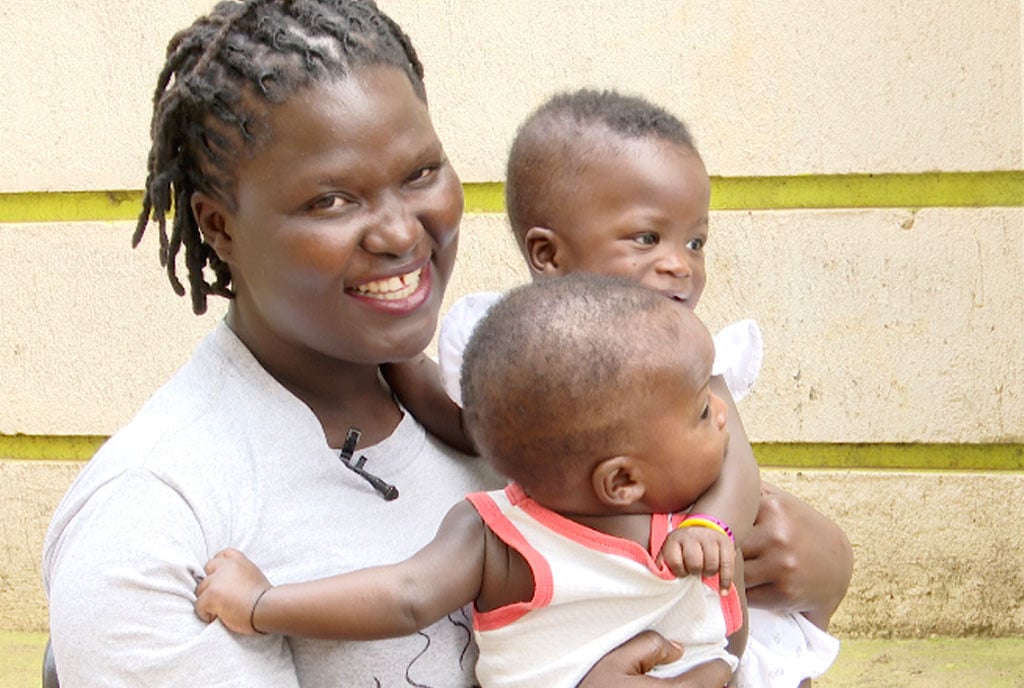Prime
One widow’s struggle to secure her inheritance from the in-laws

Nnalongo (right) outside her home talks to a field coordinator, Claire Tumusiime, from International Justice Mission, the organisation that helped her regain her inheritance by guiding her through the necessary process and gave her the backing she needed against her in-laws. Courtesy Photo
What you need to know:
Rose Nnalongo, 47, is a widow who was a victim of property grabbing last year. She narrated her ordeal to Jacinta Odongo
“The problem started after my husband’s death in 1995. My mother in-law assumed that everything my husband left behind belonged to her yet all the property was to be shared between my co-wife and I. I decided to sell some of the property including the chicken since we needed money for basic needs. Sadly, my in-laws ganged up against me claiming that I was not allowed to sell out any of the property I was left with. They insulted and humiliated me in front of our neighbours and finally threw me and my children out of our house, giving us the chicken house.
When my father in-law learned about this, he was so devastated, but there was nothing he could do to stop them. The only thing he did was advise us to be patient. Unfortunately he also passed away in March 2004 nine years after my husband’s death, but prior to his death, he wrote a will stating that his heir should be his oldest grandson, who happened to be my eldest son, Moses.
He added that, in the event that this grandson dies without naming his heir, then my co-wife’s firstborn son should be the heir.
Unfortunately, Moses died in October 2006 due to a short illness when he was almost sitting for his Senior Six exams. After his death, my brother and sister in-laws went to the village administrator and claimed for the property as it was a very big share. But because the administrator had blood relations with my in-laws, he called for a meeting with them and distributed all the property and the land amongst them. Each one got a piece of land of their choice and left us with a miserable portion.
As if that wasn’t enough, my mother in-law decided to re-divide our land. The only person who stood by our side was one of my husband’s brother who stays in a different village. He was not happy with his family members’ actions so he reported the matter to International Justice Mission (IJM). I did not know whom to approach and report the case to because I had no idea about the lawful procedure.
IJM called for an immediate family meeting where they intervened in the matter. They asked each side to testify and afterwards they read out the will. My in-laws were asked to return all the property and they did except my mother in-law who refused to hand over some land on which she had planted her crops.
She ordered us to stay away from that land until her crops were ready for harvest, threatening witchcraft. I also moved back to my house where I stay with my five children, who had all dropped out of school. My daughters became pregnant and gave birth but presently IJM is paying for their vocational training course in catering and tailoring while the rest are in primary school.
My health had deteriorated due to stress and trauma but fortunately, I also received assistance with medical bills from the mission. At the moment everything is in order although my in-laws treat me like I do not exist.
We got all our land title documents though, but I’m sure we wouldn’t if we had not got any external help for which I’m very grateful.”
To secure conflicted inheritance as a widow
1. Call a meeting inviting all interested family members and the Local Council (LC) leader to help resolve disputes. The purpose of this initial family meeting is to determine beneficiaries to the deceased property, to resolve any conflicts related to the distribution of the property and to determine which family member will appear as an Administrator on a Certificate of No Objection (CoNo).
2. Obtain a letter from the LC confirming death and explaining your relationship to the deceased. Take this letter to the Sub-County Chief, who issues the death certificate and then opens a file for a CoNo with the Administrator General’s (AG) office in Kampala. Here, you are issued with forms to fill and later issued a file number upon returning the forms. The Assistant AG then takes over and assign’s the case to Chief Administrative Officer (CAO) of the town the applicant comes from to verify consent to the mission of Letters of Administration (LOAs) and identify those who are to receive the mission.
3.The AG issues a CoNo and applicant obtains a copy and secures a lawyer’s help to draft document for filing with the court. The applicant then gets Declaration of Fitness commissioned by the court and files an application for LOAs with court registry. Court issues order granting LOAs where the applicant is declared officially as the administrator. The administrator obtains valuation of land from government land offices in Kampala where he pays taxes on land transfer. Finally, the applicant files application to transfer title with the land registry and officially issued with the land title in her names.
Source: IJM
Statutory law alone not helping widows
UN’s 2006 Human Rights report revealed that property and inheritance rights violation is a daily occurrence amongst widows in Africa.
It also said that the existence of laws did not prevent property grabbing incidences or protect widows from domestic violence in regard to inheritance, especially because the statutory laws have been overtaken by customary laws and practices.
Failure of local administrations, complex legal procedures, excessive fees, legal illiteracy and inaccessibility to legal services, bribery, customary law and most widows’ ignorance of the law, are mentioned among the key issues propagating property grabbing and violation of women’s property rights.
The empirical evidence collected demonstrats that majority of women are being forced from their homes at the death of their husbands.
In Uganda, seeking authorities’ intervention is not always enough.
Another form of gender violence
Nnalongo’s case demonstrates how property grabbing has become a major form of gender based violence as it denies women their rights to decent shelter, livelihoods and lives with self-esteem.
It also demonstrates that knowledge of women’s rights and reporting violation to respective authorities are not sufficient on their own to solve the problem of property grabbing; it has to be accompanied by responsible leadership that is accountable from international levels.
It was this leadership that International Justice Mission (IJM), a human rights organisation that secures justice for victims of property grabbing, slavery, sexual exploitation and other forms of violent oppression, offered Nnalongo.




